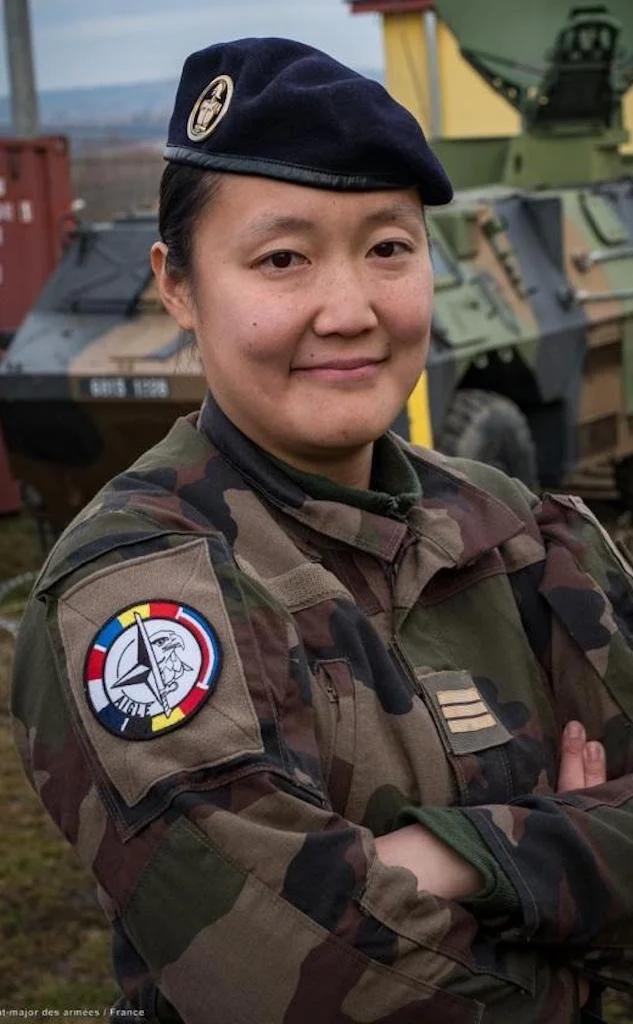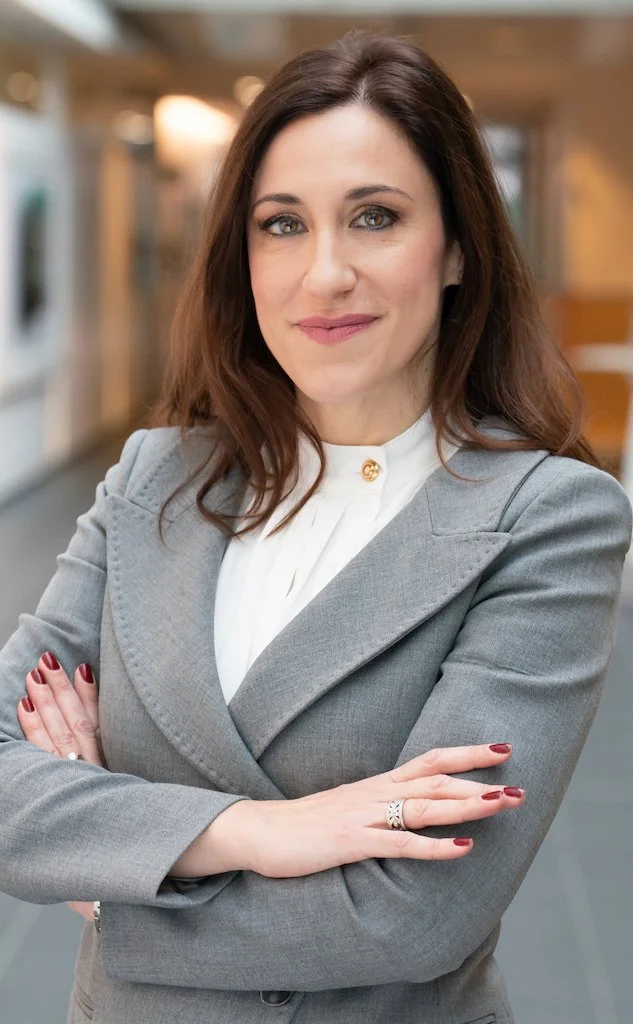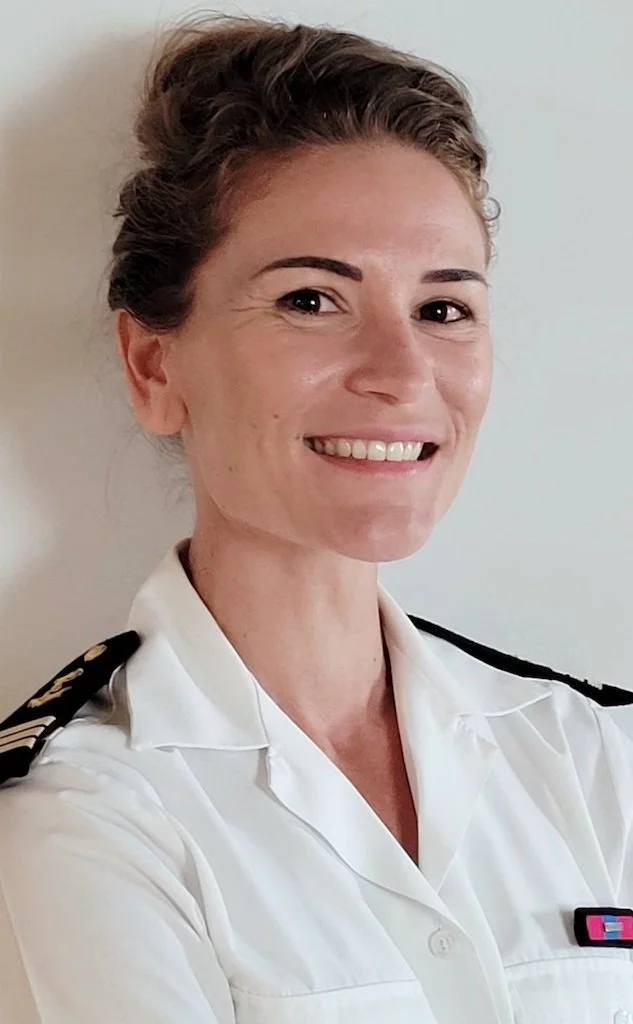Captain Caroline
Caroline. Photo credit: French armed forces general staff
Caroline, born and bred in Paris, is the first member of her family to join the Armed Forces. “I'd been attracted since I was little by security professions,” she recounts in a calm, deep voice. “When I was thinking about what I wanted to do I was attracted by the academic side of the special Military School of Saint-Cyr (ESM St Cyr) because I wanted a rounded education.”
Her father would have liked her to attend the École Polytechnique and become an engineer, but, she laughs, "I’d opted for an economic and social sciences baccalaureate, so it wasn’t possible.” [The École Polytechnique is heavy on mathematics]. Her mother was rather worried to see her daughter embark on a military career.
““You mustn’t place obstacles in your path, you have to ask questions, get the right information which will lead you to finding the job that is right for you” ”
One of the best experiences she had during her time (2012-15) at Saint-Cyr Coëtquidan, where initial training for army officers is given, was the mandatory commando course in French Guyana. “I was looking for travel, adventure, going to extra-ordinary places and French Guyana ticked all those boxes. It was this course in Guyana that made the greatest impression on me. The environment is hostile, it’s physically demanding, but the jungle environment is really surprising. You feel very small confronted by all that fauna and flora,” she says, visibly still under the spell of her experience there.
The commando course takes place at the tropical forest training centre in the “Adjudant [Warrant Officer] Szuts” camp located opposite the confluence of the Approuague and Mataroni rivers near the town of Regina, which covers 12,130km2 making it the second largest urban area in France after Maripasoula, also in French Guyana! The camp, surrounded by the Amazonian forest, is a 1h40 drive from the capital, Cayenne.
How do women cope when they are deployed in hostile areas like this, where it’s impossible to properly manage personal hygiene? “I discussed it with my section head at the time and she was the one who advised me,” explains Caroline, stressing that there is sure to be an option that will meet every woman’s preferences.
She graduated from Saint-Cyr as a young lieutenant but also with an MA in economics, which met her wish to do military training that was also academic. She was not concerned by the reputedly very difficult level of physical condition necessary to get through Saint-Cyr. “I was doing English boxing [where you only use your fists unlike French boxing which also allows you to use your feet] and then you also have to know how to push your limits. I think that was part of the challenge: you think you’ll never succeed in this or that particular trial, but you’re not alone, you’re part of a group which encourages and supports you. So there is group emulation, it's a virtuous circle.”
Caroline decided to specialise in signals A choice that may seem surprising for someone apparently more focused on economics and social sciences. She laughs. “My father and my brother both work in IT. I've been surrounded by it since I was little.” What she likes about signals is precisely this technical side.
Her job is to ensure that all communications, whether over radio, by telephone, or computers are in place and functional so that the mission can proceed smoothly. “On a mission, it's the encounters and the human side that appeal to me,” she remarks.
Caroline at work. Photo credit: French armed forces general staff
Today, this young woman is a captain in the 41st Signals Regiment (41e régiment de transmissions), after having been aide-de-camp to the general commanding the land forces for two years, based in Lille. In her current position, it’s the human side that appeals to her. She has 100 people under her command “so I can't do anything silly!” Obviously, most of them are men. But, just like her own female former section head, her authority is very well accepted. “I think mindsets are changing. There’s a generational effect. So there is still competitiveness but women are much more accepted than a few years ago, even if we still only make up 10% of the contingent in the French army.”
Caroline recognises that she frequently has to juggle between her professional life and her private life with her partner with whom she’s been for a decade, because "when I'm on a mission it's work above all. I’ve found a balance, but I have to maintain a dialogue, especially since my wife is not in the military,” she explains. Knowing that her current command mission ends in 2024, she’s already thinking about preparing the entrance exam in 2025 for the École de Guerre. Installed in the premises of the École militaire in Paris, this is where senior officers of the French armed forces (air, sea and land) train for higher command posts.
Caroline has clearly found her place and is passionate about her job. She stresses that for a woman to have a successful Army career "you mustn’t place obstacles in your path, you have to ask questions, get the right information which will lead you to finding the job that is right for you and keep in mind that everyone has their place. And above all, you have to love your job because there can be strong constraints, especially for the family.”
Caroline stands at the front of her company the day she took command. Photo credit: personal photo






